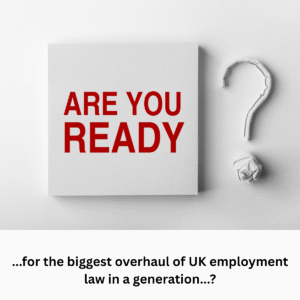Since 2012, employees have had to have two years of continuous service before they could claim ordinary unfair dismissal (there have always been exceptions to the two-year qualifying period eg if you dismiss an employee because they have raised a H&S concern, raised a grievance or blown the whistle it is automatically unfair, regardless of length of service).
This ‘safe period’ has been getting considerably more dangerous over recent years and, in their Green Paper ‘A New Deal for Working People’, Labour have proposed including many basic employment rights, such as protection from unfair dismissal, from day one of employment – this has also been included in their manifesto, which you can read here if you want the detail!
What does all this mean for employers?
Labour’s Proposals
In its original form, the Green Paper promised to “end this arbitrary system and scrap qualifying periods for basic rights such as unfair dismissal, sick pay, and parental leave”. This has now been softened slightly to state that “This will not prevent fair dismissal for reasons of capability, conduct or redundancy, or probationary periods with fair and transparent rules and processes.”
What does this mean?
In short, we don’t really know yet and will have to wait for more details. What it does suggest though is that probationary periods, which up until know have been largely a management tool, could become much more important.
What can you do to prepare?
Review your contracts now. If, as seems likely, employers will be able to dismiss unsuitable employees more easily during their probationary period, it would be wise to include a contractual probationary period of reasonable length in the contract. Six months is probably sensible, with the option to extend by a further three or six months if necessary. It might be prudent to allow an appeal against any extension.
We wouldn’t suggest trying to bypass any change by including a two-year probationary period! Not only might it be off-putting to potential employees, but we don’t actually know the detail of what Labour are proposing and it’s probable that it will be drafted in a way that would close such a loophole.
Performance management. Having a structured, formal process for reviewing performance during probation, along with a record of training and support provided, is already a good idea but will potentially become even more important. You might also want to review any other formal performance management policies you have, perhaps to include a different approach for those who have worked for you for less than two years to make the process quicker; for example, a reduced number of warnings.
Recruitment. If it becomes more difficult to dismiss employees, it is even more critical to hire the right people in the first place. Consider your recruitment strategy and whether there are any ‘weak spots’ which have caused you problems in the past. Taking someone on because ‘they’re the best of a bad bunch’ and ‘hoping for the best’ has never been a great approach, but would become even more costly and risky if it becomes more difficult to dismiss them.
But has the ‘safe period’ already gone?
There is an argument that the idea that an employer has two years to decide if someone’s the right ‘fit’ and get rid of them quickly and safely is already history. We are ourselves seeing, and hearing reported, a rise in employees with very short service bringing claims against their employers. Frequently these employees have taken advice from a solicitor or union and, knowing they can’t bring a straightforward claim for unfair dismissal, look for an alternative route.
Discrimination. Protection from discrimination applies from before the start of employment, so there is no qualifying period. Unlike unfair dismissal, there is no upper limit on awards in discrimination claims. Claims may, of course, be in any category of discrimination, but there is a particularly sharp increase in disability discrimination claims due to mental health issues and neurodiverse conditions. An employee doesn’t have to have made you specifically aware of their condition to be protected; an employer can be liable if they are ‘deemed’ to have known or ‘ought’ to have known, so-called ‘constructive knowledge’.
Grievances. If you dismiss an employee because they have raised a grievance, the dismissal is automatically unfair. Of course, you might argue that the employee had never raised a formal grievance – they just sent you a ‘whingy email’ – and that it had nothing to do with why you dismissed them anyway, but the question is, can you demonstrate that?
Whistleblowing. We were recently contacted by a small business which had an employee of only four months who just wasn’t up to scratch, particularly since they had, with reservations, told her she’d passed her three month probationary period. We were advising them about dismissing her, but they decided to give her one last chance. Only a few days later a client made an admission to the employee about a possible crime. The employee was upset and reported the incident to the police. A little while later the directors decided that actually, they did need to proceed with dismissal.
The employee sought legal advice from a charity which supported her and found her a top barrister who represented her pro bono in her claim that she had been dismissed because she had blown the whistle on a possible crime. She claimed automatic unfair dismissal but also, in a very unusual move, sought reinstatement. Fortunately for the business they had good records of their concerns, along with exchanges with us which clearly demonstrated that they had been contemplating dismissal long before the incident and they were successful at the interim hearing, an example where the paper trail was absolutely critical.
How do you dismiss someone?
Carefully! Even if someone has only worked for you for a short period of time, be very wary about just dismissing them.
Policies & Procedures. Following the ACAS Code of Practice on Disciplinary Processes is generally going to be the safest way forward and becomes essential if an employee has over two years of service. Also be aware of any additional rights you may have given your employees in your contracts or employee handbook.
Think! Could this person fall into a category of discrimination? Have they raised any concerns which might make the dismissal automatically unfair?
Disability. Might the employee have a disability, even if they have never disclosed one to you?
Records. Do you have any record or history of their performance not being up to standard? And records of training or help you’ve put in place to support them?
Settlement Agreement. This is still not 100% safe, but consider whether a formal settlement agreement might be a good way forward. There’s a specific process to follow and any agreement is only legally binding if the employee has received independent legal advice (which you will generally pay for).
Get advice. Unless you are very confident AND well-informed of the risks, take expert advice before any dismissal.
Contact us to arrange an initial, free, confidential call if you need help or support.
Please Note – The information in this article is for general guidance only, and is not a substitute for specific legal advice in any given situation.


